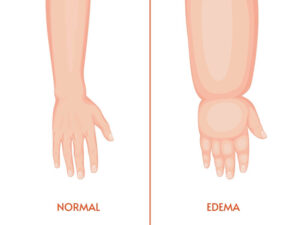Lymphedema (Lymphatic fluid accumulation) is the abnormal accumulation of interstitial fluid that may arise from recurrent infection or congenital abnormalities of the lymphatic system. The disease most commonly affects the limbs but can also occur in other body areas, such as the abdomen, genital region, face, and neck.
The increased protein concentration in the fluids can trigger inflammation and cause skin changes. If left untreated, lymphedema can lead to ulceration and infection in severe stages.
What are the symptoms of lymphedema?
- Upper or lower limbs edema
- Limbs aching and having a sensation of heaviness
- Skin ulcers and infections
- Skin feeling tight and thicker

What are the common causes of lymphedema?
- Recurrent infections that lead to damage to the venous (veins) system.
- Complications from cancer with lymph node involvement and cancer treatments like radiotherapy.
- Complications from the surgery of limbs or as a result of immobility or fractures.
- Obesity is an additional risk factor for lymphedema.
How do you manage lymphedema?
A detailed examination by a specialist is first needed to determine if your body’s accumulation of fluid (or edema) is caused by lymphatic disease, as there are other conditions with similar symptoms (such as obesity, chronic venous insufficiency, hypothyroidism, cellulitis, and fluid overload states seen in heart failure, cirrhosis, or kidney disease). After the diagnosis of lymphedema, there are several ways to manage the condition:
- Compression therapy reduces the swelling
- Good skin care decreases the risk of infections
- Manual lymphatic drainage thru massage and physiotherapy
- Regular exercise increases muscle pump activity and improves lymphatic flow
- Weight management reduces lymphedema symptoms

Surgery may be needed if there is no improvement with conservative management of lymphedema or in the case of further complications (such as chronic ulcer, reduced blood flow, or infection).
Credit: Images from Freepik
